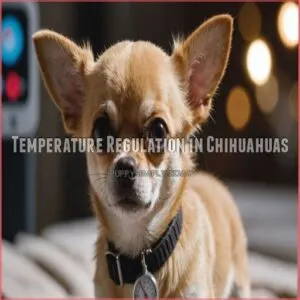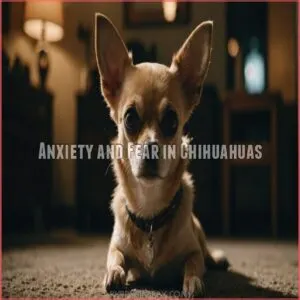This site is supported by our readers. We may earn a commission, at no cost to you, if you purchase through links.
 Chihuahuas shake for a mix of reasons, each as quirky as they are. Their high metabolism means they’re like tiny energy powerhouses, sometimes causing the shakes when their blood sugar dips.
Chihuahuas shake for a mix of reasons, each as quirky as they are. Their high metabolism means they’re like tiny energy powerhouses, sometimes causing the shakes when their blood sugar dips.
They also shiver when they’re cold, since their petite size doesn’t keep the heat in very well. Anxiety and excitement play a role too; ever seen a Chihuahua hop around like it’s on a caffeine high?
Besides these, health issues like ear infections, hypoglycemia, or even injuries can trigger shaking. Each wag and wiggle tells a story—sometimes it’s fun, sometimes it’s serious, but there’s always more to the tale!
Table Of Contents
- Key Takeaways
- Why Do Chihuahuas Shake
- High Metabolism in Chihuahuas
- Health Conditions That Cause Shaking
- Temperature Regulation in Chihuahuas
- Anxiety and Fear in Chihuahuas
- Excitement and Shaking in Chihuahuas
- Allergies and Shaking in Chihuahuas
- Injuries and Shaking in Chihuahuas
- How to Stop Chihuahua Shaking
- Common Chihuahua Shaking Behavior
- Frequently Asked Questions (FAQs)
- Why do Chihuahuas Shake a lot?
- What causes hunger with shaking?
- Why does my Chihuahua shake after bathing?
- Do Chihuahuas shake their head?
- Why does my Chihuahua tremble so much?
- Do Chihuahuas have a favorite person?
- Why does my Chihuahua quiver?
- Why do Chihuahuas go under blankets?
- Can certain foods make Chihuahuas shake more?
- Does grooming affect a Chihuahuas shaking?
- Are some Chihuahuas more prone to shaking?
- Do Chihuahuas shake differently at various ages?
- Does weather change influence shaking frequency?
- Conclusion
Key Takeaways
- You should always consider cold weather as a potential reason for your Chihuahua’s shaking, especially given their small size and thin coats. A warm sweater or coat can help.
- Your Chihuahua’s shaking might signal a health problem like hypoglycemia, ear infections, or Generalized Tremor Syndrome (GTS). Consult your vet if you are concerned.
- Anxiety and excitement are common reasons for shaking in Chihuahuas. Creating a calm environment and providing adequate exercise can help.
- A sudden onset of severe shaking, especially accompanied by other symptoms, warrants immediate veterinary attention. Don’t delay seeking professional help.
Why Do Chihuahuas Shake
Ever wondered why your tiny Chihuahua turns into a four-legged maraca? Don’t worry, you’re not alone! Chihuahuas are famous for their shaky behavior, and it’s not just because they’re nervous Nellies. There are several reasons why your pint-sized pal might be doing the shimmy shake.
Since they were originally bred to hunt rodents in ancient Mexico, it’s possible that their natural instincts, such as strong prey drive, are causing them to exhibit shaky behavior.
Cold weather is a common culprit – these little guys get chilly fast! Hypoglycemia can also cause the shakes, so keep an eye on their blood sugar. As they age, some Chihuahuas develop generalized trembling syndrome, which is like arthritis with jazz hands.
Ear infections might have your pup shaking their head like they’re at a rock concert. And don’t forget about internal injuries – these tough cookies might be hiding their pain. In rare cases, canine distemper could be the cause.
If your Chihuahua’s shaking seems unusual, it’s time for a vet visit. Better safe than sorry!
High Metabolism in Chihuahuas
Your Chihuahua’s high metabolism isn’t just about burning calories fast.
It’s a key reason why these tiny pups often shake, as their bodies work overtime to keep up with their energy needs.
Effects of High Metabolism on Shaking
Your Chihuahua’s high-speed metabolism is like a tiny engine that never stops revving.
This constant energy burn can lead to the shakes you see.
It’s as if their little bodies are always ready for action, even when they’re sitting still.
This rapid metabolism affects their temperature regulation and blood sugar levels.
You might notice more shaking when they’re hungry or cold.
It’s their body’s way of generating heat and energy to keep that little engine running smoothly.
Managing High Metabolism in Chihuahuas
To manage your Chihuahua’s high metabolism, focus on diet and exercise.
Feed them small, frequent meals to keep their energy stable and prevent shaking from low blood sugar.
Opt for high-quality dog food rich in protein and healthy fats.
Regular exercise helps burn excess energy and reduces nervous shaking.
Consider supplements to support their fast metabolism, but always consult your vet first.
Keep an eye out for signs of kidney disease, as it can affect metabolism.
With proper weight management, you’ll have a happy, less shaky pup!
Health Conditions That Cause Shaking
Your Chihuahua’s shaking might be more than just a quirky habit. Various health conditions, from low blood sugar to ear infections, can cause these tiny pups to tremble.
Hypoglycemia and Shaking
When your Chihuahua’s shaking like a leaf, it might be hypoglycemia knocking at the door.
This sneaky condition can make your pup’s blood sugar plummet faster than a roller coaster.
Keep an eye out for symptoms like weakness or confusion.
It’s also worth noting that hypoglycemia can be a complication of diabetes, which can lead to severe complications in diabetic dogs, such as ketoacidosis in dogs.
To prevent this sugar crash, feed your little friend small, frequent meals.
If you suspect hypoglycemia, a quick dose of glucose gel can work wonders.
Regular blood sugar monitoring and a balanced Chihuahua diet are your best bets for keeping this pint-sized pup steady on their paws.
Ear Infections and Head Shaking
Ear infections can turn your Chihuahua into a head-shaking machine.
If you spot your pup tilting their head, scratching their ears, or shaking excessively, it’s time to play detective.
These pesky infections can cause discomfort and even balance issues.
Don’t wait – see your vet for proper treatment.
In the meantime, keep those ears clean and dry.
Remember, healthy ears mean a happy, shake-free Chi!
Generalized Tremor Syndrome (GTS)
Generalized Tremor Syndrome (GTS) is another head-scratcher for Chihuahua owners.
This mysterious condition affects puppies, causing unexplained shaking that’s like they’re doing the cha-cha without music.
Don’t worry, though! GTS usually takes a bow after your pup’s second birthday.
While it’s hanging around, your vet might suggest corticosteroids to help manage the tremors.
Remember, a shaky pup doesn’t mean a shaky prognosis – most Chihuahuas outgrow GTS with time and proper care.
Canine Distemper and Shaking
So, GTS isn’t the only health issue causing those shakes.
Canine Distemper, a nasty viral infection, can also make your pup tremble.
Look out for Canine Distemper Symptoms like coughing and eye/nose discharge.
Early Distemper Diagnosis is key for Distemper Treatment.
Prevention is better than cure, though!
Talk to your vet about Distemper Prevention and be aware of potential Distemper Complications.
Don’t panic, but do act quickly if you suspect it.
Seizures and Shaking in Chihuahuas
Imagine your Chihuahua shaking like a leaf during a breeze.
Seizures can be confusing, but understanding the triggers and management is essential.
Here’s a quick guide:
- Identify seizure triggers to prevent future episodes.
- Consult a vet for an epilepsy diagnosis.
- Develop a seizure management plan.
- Learn seizure first aid for swift, safe responses.
Temperature Regulation in Chihuahuas
You might wonder why your Chihuahua is shivering in the corner, even when it’s not freezing cold.
These little dogs, with their tiny frames, are more sensitive to temperature changes, so keeping them cozy in a warm outfit isn’t just a fashion statement—it’s essential for their comfort.
Cold Temperatures and Shaking
When health hiccups aren’t the culprit, chilly air might be behind your Chihuahua’s shivers.
These tiny pups have little padding against the cold, making them prime candidates for shivering spells.
Cold weather symptoms are no joke for these petite pals.
You might notice them yearning for a snuggly spot.
Investing in Chihuahua coats or dog sweaters could be a wise move.
Keeping Chihuahuas Warm
Keeping your Chihuahua warm isn’t just cozy; it’s essential for their health.
Winter coats can shield them from the chilly breeze.
Make sure sweater sizes fit snugly to trap heat.
Create cozy indoor spaces with thermal blankets.
Know their cold tolerance to adjust their environment—nobody likes shivering, not even Chihuahuas!
Breeding and Temperature Regulation
Chihuahuas might shake because they’re often bred without cold tolerance in mind.
Think about their coat types, too—thin coats mean less natural warmth.
Want a cozy Chi? Consider climate and winter clothing for better temperature control.
| Factor | Impact on Chihuahuas |
|---|---|
| Breeding | Cold sensitivity |
| Coat Types | Reduced warmth |
| Winter Clothing | Improved temperature control |
Stay warm, little pup!
Anxiety and Fear in Chihuahuas
When your Chihuahua starts shaking, it might be their way of saying they’re feeling anxious or scared, just like us when we face our own fears, like meeting new people or watching a scary movie.
Understanding these signs can help you create a safe and comforting environment, reducing their stress and keeping those wobbles at bay.
Signs of Anxiety and Fear
Notice your little one’s body language?
Anxiety in Chihuahuas often shows up in subtle ways.
Is your pup exhibiting any of these signs?
- Trembling or shaking uncontrollably.
- Excessive pacing or hiding behavior.
- High-pitched vocalization or whining.
These aren’t just quirks; they’re cries for help!
Understanding these signals is the first step to helping your furry friend feel safe and secure.
Managing Anxiety and Fear in Chihuahuas
An anxious Chihuahua can shake like a leaf in the wind.
To help them find their zen, create safe spaces they can retreat to.
Use training and socialization to build confidence.
Desensitization to noises can ease fears, too.
Throw in some calming techniques, like gentle music, to soothe those nerves.
It’s all about creating a cozy, fear-free environment.
Reducing Stress and Nervousness
To ease your Chihuahua’s worry, create a cozy hideaway where they can retreat when the world feels overwhelming.
Try using calming techniques like gentle music or soothing scents.
Regular playdates with other dogs help too, as socialization tips the scales in favor of peace.
Watch for signs that your Chihuahua may be experiencing anxiety, like pacing or growling, which can be indicators of Rottweiler anxiety triggers. Watch for anxiety triggers and manage stress with patience and attention, ensuring a happier pup.
Excitement and Shaking in Chihuahuas
When your Chihuahua starts shaking with excitement, it’s like they’ve had too many espressos!
This jittery behavior is common and usually just their way of burning off all that abundant energy, so don’t worry too much.
Causes of Excitement in Chihuahuas
Chihuahuas can shake with excitement when it’s playtime, during walks, or when meeting new people and getting treats.
Imagine this: your little furball sees a new toy, they might tremble with sheer joy.
This excitement triggers an adrenaline rush, leading to those familiar shakes.
It’s like their enthusiasm is bubbling over!
Understanding these triggers can help you appreciate your Chihuahua’s antics and make sure they’re just happy, not anxious.
Managing Excitement and Shaking
When your Chihuahua shakes with excitement, harnessing their energy in a positive way is key.
Calm them with a soothing voice or gentle petting.
Training methods, like obedience training, teach them self-control.
Try these approaches:
- Energy release: Encourage playtime or walks to burn off energy.
- Calming techniques: Use soft music or a quiet space.
- Consistent routines: Establish predictable daily schedules.
A well-managed Chihuahua is a happy one!
Allergies and Shaking in Chihuahuas
Ever notice your tiny pup shaking after trying a new treat?
Food and environmental allergies can set off tremors in your Chihuahua, making it important to watch what they eat and sniff.
Food Allergies and Shaking
Sometimes, that excited shaking could actually mean something else entirely.
Food allergies can cause similar symptoms.
Let’s explore this!
Does your little one get the shakes after eating something new?
| Food Allergy Symptoms | Common Allergens | Identifying Triggers |
|---|---|---|
| Itching, vomiting, diarrhea | Chicken, beef, dairy | Food diary, elimination diet |
| Skin rash, ear infections | Grains (wheat, corn) | Vet advice, allergy testing |
| Shaking, lethargy | Soy, fish, eggs | Careful observation, process of elimination |
Dietary changes, guided by your vet, might be the answer.
Don’t hesitate to seek professional help.
Environmental Allergies and Shaking
Imagine this: Your Chihuahua’s shaking might stem from pesky environmental allergies. It’s like being allergic to a season.
If you suspect allergies, you can find products to help soothe their tremors, such as those found in Chihuahua tremor products.
Here’s how you can help:
- Common allergens: Dust and pollen are usual suspects.
- Seasonal triggers: Spring and fall can be tricky times.
- Allergy testing: Consult a vet to pinpoint allergens.
- Treatment options: Antihistamines and nasal sprays that are pet-safe.
Take these steps to ease your pup’s symptoms!
Injuries and Shaking in Chihuahuas
If your Chihuahua starts shaking, it might be more than just a cold day—injuries could be the culprit.
Both internal injuries, like organ damage, and external ones, like scrapes or bruises, can cause your little friend to tremble and need attention from a vet.
Internal Injuries and Shaking
Chihuahuas, with their petite frames, are prone to internal injuries, often from accidental falls or rough play.
If your furry friend starts shaking more than maracas in a Latin dance band, it might be a symptom of something serious.
In such situations, knowing pet CPR and first aid for dog owners can be a lifesaver in emergency situations.
Vet visits are essential to gauge symptom severity and guarantee proper care.
| Symptom | Severity | Action |
|---|---|---|
| Lethargy | High | Visit Vet |
| Shaking | Moderate | Monitor |
| Pale Gums | Severe | Immediate Care |
| Loss of Appetite | High | Call Vet |
| Whining | Moderate | Comfort & Watch |
External Injuries and Shaking
External injuries, like bumps or scrapes, might seem minor, but they can send a Chihuahua shaking.
Their little bodies are sensitive, and even a small injury can cause discomfort and stress.
You’ve got to be the band-aid hero here!
Check for cuts or bruises, and if needed, apply basic first aid.
Keep a watchful eye, and if your pup’s shaking persists, consider consulting a vet for further treatment options and prevention tips.
How to Stop Chihuahua Shaking
You can help stop your Chihuahua from shaking by identifying and addressing the root cause.
Whether it’s providing a cozy sweater for warmth or seeking a vet’s advice for health conditions, a little care and attention go a long way.
Addressing Underlying Causes
When your Chihuahua starts shaking from an injury, pinpointing the root causes helps.
Think of it like tuning a guitar—get the basics right.
Try these steps:
- Diet: A balanced diet supports metabolism; check for allergies.
- Exercise: Regular activity burns energy and calms nerves.
- Environment: Create a cozy, comforting space for your pup.
Providing Proper Care and Attention
So, you’ve tackled the underlying issues? Great! Now, let’s focus on daily care.
A balanced diet and regular exercise are key, and incorporating activities like scent walks and mental stimulation can also help reduce anxiety.
Make sure they get enough sleep; a comfy bed is a must!
Grooming helps them feel good, and socialization builds confidence.
Remember, a happy pup is a healthy pup, less likely to shake from stress. These simple steps can make a world of difference!
Seeking Veterinary Help
Have you noticed your Chihuahua’s shaking getting a bit out of hand?
It might be time for a vet visit.
If you suspect that your Chihuahua is shaking due to a cold, consider exploring products designed to help with Chihuahua cold relief.
Recognizing emergency signs like persistent tremors paired with other symptoms, such as vomiting or diarrhea, is very important.
Don’t wait to seek urgent care if shaking seems severe.
Investing in your Chihuahua’s health will lead to fewer worries and more tail wags!
Common Chihuahua Shaking Behavior
Chihuahuas are known for their shaking, and understanding what’s normal versus what’s not can help you keep your pup healthy.
While a bit of shivering may be just their way of saying they’re chilly or excited, persistent or severe shaking might signal a health concern that needs your attention.
Normal Shaking Behavior
Spotting your Chihuahua shaking can be unsettling, but often it’s just part of their charm.
These tiny fireballs shake to release energy or when excitement levels soar, much like a toddler at a party.
Similar to dogs experiencing Frenetic Random Activity Periods, Chihuahuas may also exhibit bursts of energetic behavior.
Cold weather can make them tremble as well, since they’re not equipped with much insulation.
Especially during their playful puppyhood phase through various age-related changes, a little shake is just their way of expressing life’s thrills.
Abnormal Shaking Behavior
If Chihuahua’s shaking turns into an Olympic event, it might signal trouble.
Shaking coupled with seizures, signs of poisoning, or persistent tremors like those from Generalized Tremor Syndrome (GTS) calls for vet advice.
In many cases, Chihuahua owners opt for shivering relief products.
Trust your instincts—they’re as seasoned as grandma’s cooking!
Notice sudden changes or prolonged shaking? Reach out to a vet right away.
Remember, catching problems early keeps your tiny pal safe and sound.
Frequently Asked Questions (FAQs)
Why do Chihuahuas Shake a lot?
Ever wonder why your Chihuahua’s a tiny, shivering ball?
It could be cold, scared, excited, or even low blood sugar.
Small size means big reactions!
Consult your vet if you’re worried.
What causes hunger with shaking?
Feeling shaky when hungry isn’t unusual.
Your body may be running low on fuel, causing blood sugar to drop.
Think of it like a car needing gas to run smoothly.
Eating something nutritious can help stabilize you.
Why does my Chihuahua shake after bathing?
Imagine stepping out of a hot shower into a chilly room.
Your Chihuahua shakes post-bath due to being cold or anxious.
Wrap them in a warm towel and offer comforting words to help them calm down.
Do Chihuahuas shake their head?
Yes, Chihuahuas shake their heads.
This can happen if they’ve an ear infection or irritation.
Regular vet checkups help identify issues early.
If head shaking continues or is severe, seek veterinary advice pronto.
Why does my Chihuahua tremble so much?
Your Chihuahua might tremble like a jittery leaf due to anxiety, excitement, or cold.
Their fast metabolism and tiny size make them shake easily.
Make sure they’re warm, well-fed, and relaxed.
Consult a vet if concerned.
Do Chihuahuas have a favorite person?
Chihuahuas often bond closely with one person, showing them special affection and loyalty.
They’ll follow you around like a little shadow, keen for attention and cuddles.
This bond makes them a perfect companion for singles or small families.
Why does my Chihuahua quiver?
A quivering Chihuahua might be cold, scared, or excited.
These small dogs shake due to their high metabolism and sensitivity.
Make sure they’re warm, comfortable, and stress-free.
If shaking persists or seems unusual, consult a vet.
Why do Chihuahuas go under blankets?
They’re probably cold!
Little dogs like Chihuahuas need extra warmth.
It’s their way of staying cozy and comfy.
A warm blanket is a tiny dog’s best friend, especially on chilly days.
They might also be seeking a safe space.
Can certain foods make Chihuahuas shake more?
Certain foods, especially those causing allergies, can make Chihuahuas shake more.
It’s like a stomach disagreement that leads to shaking.
Watch out for new foods and stick with proven favorites to keep them steady and happy.
Does grooming affect a Chihuahuas shaking?
Grooming doesn’t directly cause Chihuahuas to shake, but anxiety or stress from the process might.
Make grooming a positive experience with treats and gentle handling to reduce stress-related shaking.
Regular grooming also keeps them comfortable.
Are some Chihuahuas more prone to shaking?
Imagine your Chihuahua shaking like a leaf in a hurricane!
Some are just more sensitive to cold, anxiety, or excitement.
It’s all about personality, genetics, and sometimes health.
Observing triggers helps make sure your pup stays comfy.
Do Chihuahuas shake differently at various ages?
Chihuahuas might shake differently based on their age due to varying energy levels, metabolism, and health conditions.
Puppies often shake more from excitement or GTS, while older Chihuahuas might shake due to anxiety or health issues like arthritis.
Does weather change influence shaking frequency?
When the seasons shift like a rollercoaster, your Chihuahua may shake more frequently.
Their small bodies and thin coats make them sensitive to cold.
Bundle them in snuggly sweaters to keep them cozy and calm their shakes.
Conclusion
Just like a quirky dance, the reasons why Chihuahuas shake are as varied as they’re fascinating.
These tiny companions might shiver from excitement, cold, or health issues—each shake tells its own tale.
Knowing why Chihuahuas shake helps you provide better care, keeping your furry friend comfortable and happy.
From managing their metabolism to understanding their needs in cold weather, staying informed helps prevent those wiggles from turning into worries.

















